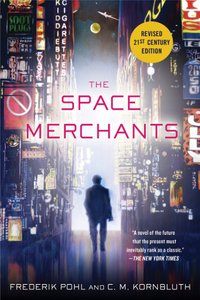Books |
The Space Merchants
Frederik Pohl and C.M. Kornbluth
By
Published: May 27, 2014
Category:
Fiction
As I dressed that morning I ran over in my mind the long list of statistics, evasions, and exaggerations that they would expect in my report.
This isn’t the way science fiction books begin. Science fiction is about rockets and space and aliens and women you can program.
These are the words of an advertising copywriter who’s describing what awaits him at the office — it’s the voice of a character in “Mad Men.”
That corporate focus is the first reason “The Space Merchants” is considered a classic — a novel that “has many claims to being the best science-fiction novel so far,” said Kingsley Amis, the great English novelist. First published in 1953, it has been translated into 25 languages. The film rights sold for $50,000, an unprecedented sum for a science fiction novel in the 1950s.
But to speak of “The Space Merchants” as science fiction is to ghettoize it. What Frederik Pohl and C.M. Kornbluth — no, we’re not related — accomplished here is a visionary novel that’s right up there with Aldous Huxley’s “Brave New World.” [To buy the paperback from Amazon, click here.]
The novel is set in the United States at some point in the mid-21st century. Life sucks. The planet is over-populated and filthy. Many sleep in the stairways of office buildings. The coffee substitute — Coffiest — contains an addictive alkaloid that, after ten weeks, addicts you for life. Only the fortunate can enjoy “hundreds of acres of rooftops where men and women could walk around in the open air, wearing simple soot-extractor nostril plugs instead of a bulky oxygen helmet.” Fresh food?” “If ‘Nature’ had intended us to eat fresh vegetables, it wouldn’t have given us the can.”
Depressing — but it’s the political and social reality that’s really terrifying. The culture is controlled by two advertising agencies, Fowler Schocken Associates and B. J. Taunton. Government is a formality; corporations rule. Yes, there are senators from DuPont and Disney.
There’s an endless competition between Taunton and Fowler Schocken, and Fowler Schocken is now pulling ahead. It won the right to “brand” India, and has successfully organized the country into “a single giant cartel.” Now it’s scored an even bigger prize: Venus. Yes, Congress has awarded the branding and exploitation of an entire planet to the agency.
Oh, there are challenges ahead. The atmosphere of Venus is mostly formaldehyde. The heat is above the boiling point of water, not that there’s water on Venus. The wind? 500 miles an hour.
Venus is a cosmic shithole.
The challenge is to sell it.
Not the biggest challenge — what is advertising but selling things people don’t need to people who don’t want them? — for Mitch Courtenay, ace copywriter with Fowler Schocken.
Not nearly as challenging as getting Kathy to marry him.
Or so Mitch thinks.
“The Space Merchants” is a zippy, 239-page ride that takes Mitch into a layer cake of social and economic strata he never knew in his copywriter days. Which is to say: the novel has a real plot, not just a cartoon war between good guys with blasters and bad guys with cannon.
And it has “Consies” — conservationists who don’t go along with the program and are trying to restore life as they used to know it.
This is what Mitch discovers in his interactions with Consies:
The interests of producers and consumers are not identical.
Most of the world is unhappy.
Workmen don’t automatically find the job they do best.
Entrepreneurs don’t play a hard, fair game by the rules.
The Consies are sane, intelligent, and well organized.
How do you recognize a Consie? You can’t. But if you care about preserving a shred of what we think of as a decent, democratic society, you’ll root for them. You might even want to learn the secret handshake.


